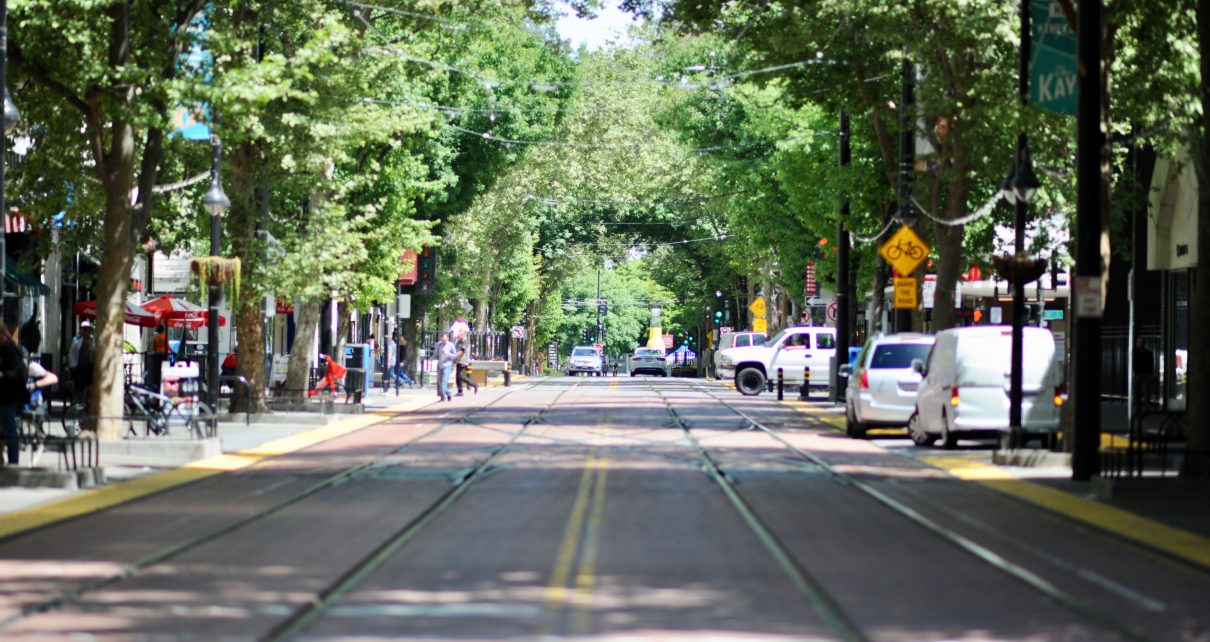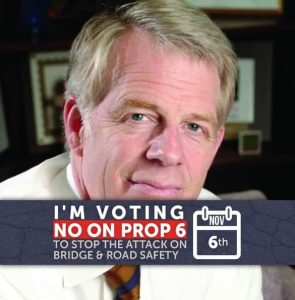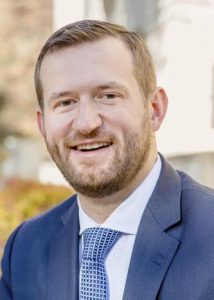
Regional Transit Light rail tracks, downtown Sacramento. (Photo: Kevin Sanders for California Globe)
Local Sacramento Politicians Propose 40-Year Climate Change Sales Tax
Area politicians ‘are going to give people options to get out of cars’
By Katy Grimes, December 2, 2019 1:51 pm
‘Only talking about roads is a bygone era and we have to evolve beyond that.’
A group of city and county politicians is working on a November 2020 ballot measure to increase the local sales tax another half cent, “to improve transportation – with an emphasis on offering alternatives to more roads for more cars,” the Sacramento Bee reported last week.
The City of Sacramento sales tax is currently 8.75%, of which 1% goes to city and county transportation funds. Sacramento County sales tax rate is 7.75%.
The Measure A proposal is expected to raise more than $8 billion locally over the next 40 years “for new bridges, light rail lines, bike paths, freeway interchanges and sidewalks to schools.”
Sacramento currently has light rail, bus service, carpool lanes, “traffic calming” projects, auto “lane diets,” bike paths, pedestrian-friendly sidewalks and freeway interchanges. And the county already collects a half-cent sales tax for transportation projects, as well as funding from the gas tax passed in 2018 which is supposed to be used for state and local transportation projects.
“A draft proposal is expected to be presented to the Sacramento Transportation Authority board in two weeks, but a debate is already well underway about how much money should go to making car travel easier and how much should go to alternatives aimed at reducing greenhouse gas emissions,” the Bee said. “But interviews with several members of the STA board suggest the group is looking for a balance of projects that suit rural and suburban residents who must rely on cars, while also offering urban residents efficient non-car options, such as ride-share electric buses, light rail, safer bike lanes and safer urban walking.”
“Many specialty groups have come to STA to lobby,” STA board member and Sacramento City Councilman Jeff Harris said. “Our job is to find that sweet spot in the middle.”
Who is behind the latest tax push?
Former State Assemblyman and former Sacramento County Supervisor Roger Dickinson, who along with former Sacramento City Councilman Steve Cohn, says Sacramento needs to build a transportation system to decrease car use to fight global warming.

“‘Climate change is real,’ former Sacramento City Councilman Cohn said at a recent rally outside a Sacramento Transportation Association board meeting,” the Sacramento Bee reported. “We need to change the way we do business.”
Dickinson, who most recently was the Executive Director of Transportation California through the “No on Prop. 6” campaign, and Cohn, who “consults for select clients on energy, transportation, environmental, and land use,” say they are lobbying for a focus on transit, such as light rail and other alternatives to cars. They say it’s time Sacramento built a transportation system that decreases car use and fights global warming.
Existing transportation funding
There have been two Measure U ballot initiatives: one was a temporary half-cent sales tax sold to voters as necessary to restore the city services cut during the recession. The second Measure U doubled that half-cent sales tax and made it permanent, to replenish city services and police and fire personnel.
In 2012, in addition to Gov. Jerry Brown’s Proposition 30, which increased income taxes on the top 1 percent wealthiest Californians and increased the state sales tax, Sacramento city voters passed Measure U, a “temporary tax” to allow the City to enact a half-cent sales tax for six years with all revenue going to the City’s General Fund.
Proponents claimed the “temporary measure” was needed to stop the loss of city services and jobs blamed on the recession. The City of Sacramento said Measure U was needed to restore police and fire services, park maintenance and other essential services that were cut between 2008 and 2013, and protect City services. The city made it appear unthinkable that voters would deny police, fire and parks their rightful budgets.
Then in 2018, Sacramento Mayor Darrell Steinberg announced yet another Measure U on the ballot to double the half-cent sales tax and make it permanent, raising Sacramento’s sales tax to 8.75 percent.
The second Measure U also passed.
Earlier this year, Sacramento Mayor Darrell Steinberg admitted that “every penny” of new Measure U revenue would go to pensions and salaries. “Salaries and pensions are going to put us in the red,” Steinberg warned.
What voters want versus what politicians want
Local city council members say because they expect more population growth in the region, rail transit and bus service must be beefed up. But when voters are polled they say they want road improvements and streets repaved, the Capital City Freeway widened to relieve traffic congestion, and light rail finally extended to the Sacramento International Airport – an extension that has been promised for two decades.
Both the Sacramento Transportation Association and Sacramento Regional Transit boards of directors are made up only of local politicians (see below).
When the Bee reports that “A group of city and county leaders is assembling a November 2020 ballot measure,” it is local politicians pushing for another tax increase that they will then be in charge of administering and spending.
Voters polled
“The telephone poll, conducted by Measure A advocates, suggests county voters would be willing to increase the sales tax if it gets them the projects they want,” the Bee reported. “But the vote will be close. Some 65 percent of respondents said they would support a 30-year tax, and 62 percent said they would vote for a 40-year tax. Those numbers are below the 67 percent, or two-thirds, majority needed to pass the tax under California election law.”

With local politicians in possession of every transportation board seat, “Distribution of Measure A money would be overseen by the STA.”
One local city councilman explains his position: “Sacramento Councilman Steve Hansen and others are pushing for more funds on the American River Parkway, which serves as a bike commute and recreation route and as wildlife habitat. ‘We’re not going to just build roads,’ Hansen said. ‘We are going to give people options to get out of cars. We have to do many things to get a two-thirds vote, but if it is not a forward leaning plan, it is not going to pass muster. Only talking about roads is a bygone era and we have to evolve beyond that.'”
Sacramento Regional Transit, which operates buses and light rail trains, has had historical financial difficulty, and sometimes quite seriously. Yet, “much of it due to RT’s own making,” according to Eye on Sacramento, a local think tank and government watchdog. “For example, RT has approved three to four percent wage and salary hikes in recent years at a time when the cost of living was rising only one percent,” EOS said. Annual ridership has been in decline for several years.
“The Board also approved spending $45 million in local Measure A sales tax funds to build a single mile of light rail track,” as well as “a recent 10% fare increase, likely to be followed by another 10% fare increase next year.”
Now there is talk from Regional Transit about wanting to replace its natural gas bus fleet with electric buses. It wasn’t that long ago RT was promoting its fleet of clean natural gas buses, and opened its “state-of-the-art compressed natural gas fuel station at its new bus maintenance facility.”
The Sacramento Transportation Authority Governing Board consists of sixteen members:
5 members of the Sacramento County Board of Supervisors
- Phil Serna
- Susan Peters (Chair)
- Sue Frost
- Don Nottoli
- Patrick Kennedy
5 members of the Sacramento City Council
1 member of the Citrus Heights City Council
2 members of the Elk Grove City Council
- Patrick Hume
- Darren Suen (Vice-Chair)
1 member of the Folsom City Council
1 member from the Galt City Council representing the Cities of Galt and Isleton
1 member of the Rancho Cordova City Council
Sacramento Regional Transit Board:
| Patrick Kennedy | SacRT Chair Sacramento County Board of Supervisors Vice Chair- District 2 supervisorkennedy@saccounty.net |
| Steve Hansen | SacRT Vice Chair Sacramento City Vice Mayor – District 4 shansen@cityofsacramento.org |
| Linda Budge | SacRT Board Member Rancho Cordova City Council Member lbudge@cityofranchocordova.org |
| Jeff Harris | SacRT Board Member Sacramento City Council Member – District 3 jsharris@cityofsacramento.org |
| Pat Hume | SacRT Board Member Elk Grove City Council Member phume@elkgrovecity.org |
| Rick Jennings, II | SacRT Board Member Sacramento City Council Member – District 7 rjennings@cityofsacramento.org |
| Steve Miller | SacRT Board Member Citrus Heights Mayor smiller@citrusheights.net |
| Kerri Howell | SacRT Board Member Folsom City Council Member corrprincess@ardennet.com |
| Don Nottoli | SacRT Board Member Sacramento County Board of Supervisors – District 5 nottolid@saccounty.net |
| Jay Schenirer | SacRT Board Member Sacramento City Council Member – District 5 jschenirer@cityofsacramento.org |
| Phil Serna | SacRT Board Member Sacramento County Board of Supervisors – District 1 SupervisorSerna@saccounty.net |
- ‘Fix Prop. 47’ Ballot Initiative is a Game Changer on Day 1 - April 19, 2024
- California Lawmaker Making the State More Hostile to Business - April 18, 2024
- California Democrats’ Backdoor Reparations Scheme - April 17, 2024





So they can “Redistribute” them to their own Pet Projects!!!